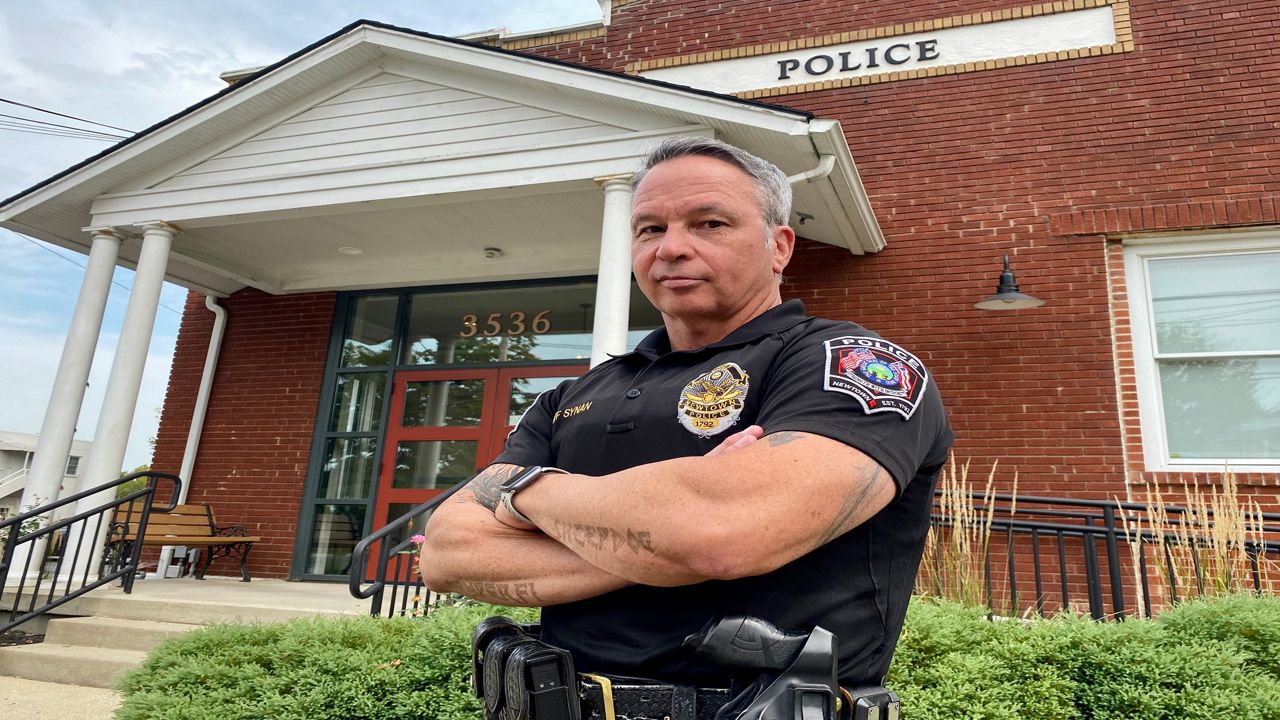Editor’s Note: Newtown Police Chief Tom Synan’s story is the first in the three-part series, “The Other Side of Addiction.”
NEWTOWN, Ohio — From the day he was born, Tom Synan knew he wanted to change the world. But it wouldn’t be easy.
What You Need To Know
- Tom Synan proudly touts many titles: Police chief, Marine, addiction coalition founder and… Batman
- Synan has a plan to get to the other side of addiction in Hamilton County
- Amid several awards, it’s those who he helps in the community that is the biggest honor for the police chief
Synan was, by his own description, short and small when he enlisted into the U.S. Marine Corps in 1986. His stature, however, wasn’t going to stop him from achieving his goals.
But first, he would have to make it through boot camp and training school.
The 110-pound Marine marched a rugged 20-25 miles through the woods with his unit, hunched over carrying a 75-pound pack, which included a 25-pound missile and a 50-pound machine gun. Physically, he said, he could not stand up straight. And when his machine gun’s receiver would dislodge on his back, it would knock him to the ground.
"I'd be like a turtle. I couldn't get back up. So, people would have to help me up. So, I started falling behind and I became the weakest link,” Synan recalled. “No matter how mentally tough you are, there's a physical aspect of it."
Viewing him as the weak link, his sergeant hit the young Marine in the head with the butt of his rifle, knocking him unconscious, Synan remembered.
The next thing he knew, he was waking up in a puddle of mud, getting hit and kicked.
"I'm thinking, ‘Where the hell am I?' And I remember people coming over, ‘Stop, stop, stop!’”
He got up with the help of his unit and kept moving.
"What it taught me was that there's not always going to be that person that supports you. There's going to be time to draw on your own. But what it did do, was it highlighted the people that are willing to help you."
And while boot camp and his field training were physically and mentally challenging, he never gave up — instead he persevered. He got back up no matter how many times he was knocked on his back.
"I learned from the Marine Corps that there's multiple stages of hard times. And probably the hardest one I went through was, I made it through boot camp,” he said. “Sometimes people will encourage you to become the strong link and there's other people who would discard you."
"But that incident in the Marine Corps, by laying there in a puddle, taught me forgiveness, taught me perseverance. It taught me that in order for me to get what I want, I have to take some ownership and responsibility, and I have to do things to get me to that point and get back up."
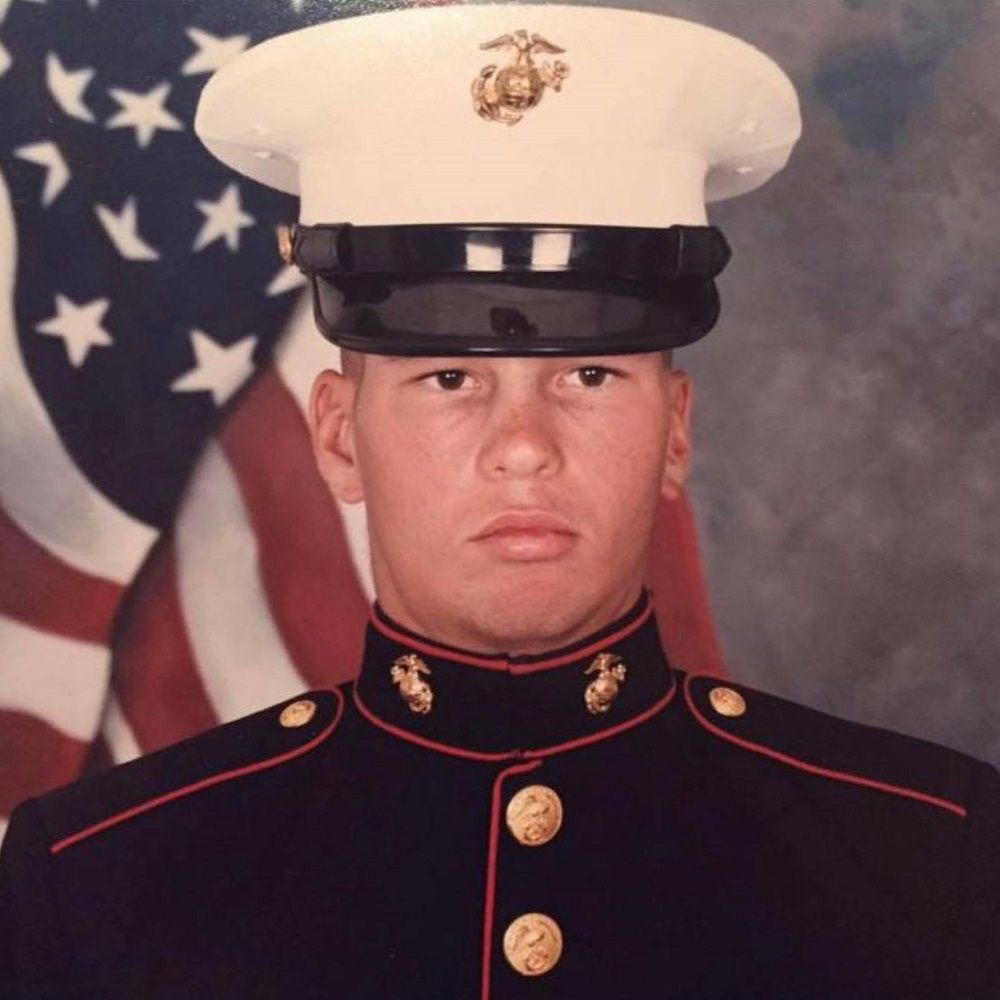
Following the Marine Corps, Synan moved into a small apartment in Newport, Kentucky.
He had little to no money for parking or gas, so he would walk to his full-time gig at the Westin Hotel during the day. Then, he would use what cash he did have, to drive to Terrace Park and work for free as an auxiliary officer and attended the police academy at night.
Because, he said, being a police officer was ultimate goal.
When being broke caught up with him, he sought help from a financial counselor, who told him he had to give up policing for free and get another job, or he would have to file for bankruptcy.
"I was stunned. I was like, 'I can't give up. Policing is my dream. How do I save the world if I'm not a cop?’ And she said, ‘Sometimes you have to give up on your dreams.’ And I it was like, boom — a punch in the gut.”
Crying and upset, he told her, admittedly in a dramatic fashion: "I'll show you, I'll be a cop one day.”
He left her office vowing not to give up on his dream. But, he said, she was right. He had to file for bankruptcy.
"I had nothing. I had no possessions, basically. But I had my dream of being a cop,” he said.
And on March 1, 1993, he walked into the Newtown Police Department and become a full-time police officer.
Today, he is the Newton police chief, and has been for 13 years.
But 53-year-old proudly touts many titles: Marine, Newtown Police Chief, founder of the Hamilton County Addiction Response Coalition and… Batman.
But, perhaps that is one of his most treasured titles. That’s because, he said, he can relate to the superhero’s human qualities, grit, perseverance, determination, humility and vulnerability.
"Batman has this incredible -- even though he's a fictional character -- he has this incredibly bad thing that happens to him. His family's killed in front of them. He has a choice of going down the bad path or a right path. But the thing about Batman… Bruce Wayne is a human being, first and foremost. He wasn't born on a different planet. He didn't have any superpowers. He was inspired by hardship."
When Batman is knocked down, Synan said, he gets back up and continues to fight for his mission to make the world a better place, even through his own sacrifice.
“That's the whole thing about Batman, is I look at Batman like being a cop,” he compared. "You have all the good and the bad that happens. Are you still going to continue on with your mission? Are you gonna make the sacrifices? Are you able to consolidate all that's happening and still be able to do good for the world?”
For him, the answer has always been, yes.
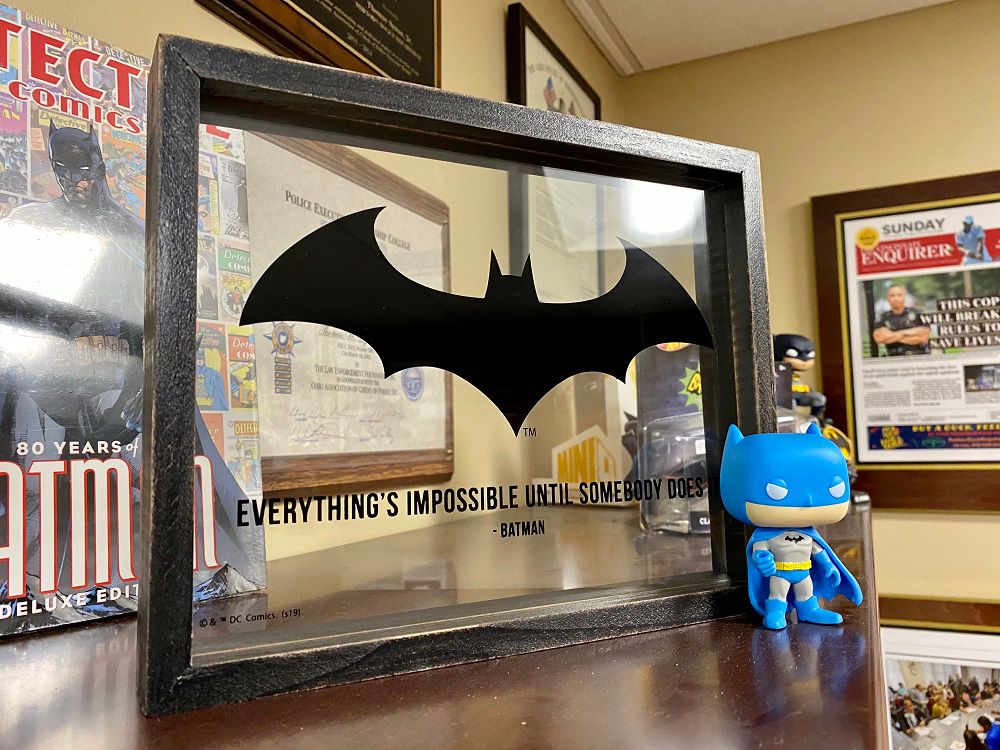
Opening The Door to The Other Side of Addiction
“We all face the same issues, maybe a little bit different, maybe a different person, maybe it's a different addiction, maybe it's a different mental health issue, but we all deal with these hard parts of life, these struggles in life — and often, they're chronic. We deal with these long-term issues that don't have a simple answer. They’re all complex, because we're human beings,” Synan said.
However, he said, if you have compassion for other people's journey, then you have the ability to begin to understand.
"And with that understanding, you have the ability to open the door."
As a police chief and the founder of the Hamilton County Addiction Response Coalition, he aims to open the door to conversation and working toward solutions for his community with his community.
Founded in 2015 as the Hamilton County Heroin Coalition, Synan soon realized that addiction of all forms was the main priority. He forged relationships with several key leaders within the community who could help him on his mission to eradicate the addiction crisis in the county.
The coalition considers themselves an "an action team who connect people to the right resources and right treatments."
Since its start, it has earned international recognition as a model program in addiction response, working in five areas of expertise: prevention, treatment, harm reduction, law enforcement and first responders — all taking a look at how things are done and how they could be done differently, and maybe, more effectively, he said.
For Synan, the coalition represents a community coming together, collaborating to solve a community problem impacting everyone — because addiction does not discriminate, he said. It is taking a microscope to the problem, what’s being done and how things can be changed to help more.
"I tell people, my tools before the coalition to deal with addiction was handcuffs, a gun, a Taser and jail. Those didn't help an entire family. So, we have to think of something different,” Synan said. "I think from a law enforcement perspective, we had to say we can't do this all on our own. We need help. We can be the link because we're the ones out there 24 hours a day; let us be the link to the other services… But don't look at us to solve it. Law enforcement will not solve addiction, mental health, race or cultural issues. We don't have the longevity, the resources and ability, skill set and knowledge to do that. We can be a link to doing things differently, to connect those issues to longer-term services that can work on chronic conditions.”
"I think that it needs to be a bigger shift. And I think addiction, the way we've been dealing with addiction, mental health, all that's included, is kind of the foundation for other parts of change,” he surmised.
The coalition; however, goes beyond law enforcement and community leaders’ ideas.
"The thought with the coalition was that it was never going to be just addiction, that there was peripheral social issues that can be dealt with, because you have a diverse group of community members and leaders who are looking at it from a community health viewpoint to find a community solution. Because when you talk about, whether it's addiction, mental health, race, culture, policing, no matter what it is, we're all human beings and are all complex. There is not a right or wrong."
So, the coalition asks the question, “If you could fix addiction, what would you do?”
"And that's where the recovery people come in,” he explained "Some of the best advice I've ever got is from people in recovery. They go, ‘Look, yeah, you're well-intended. But that won't work. Because of this, here's what will work.' That's how you fix things. You include them in the conversation. You include them as part of the community. You include them as part of the solution.”
Including those in recovery in the conversation, Synan said, is vital because it is a matter of life or death — especially since COVID-19 struck Hamilton County.
On average, the county has 50-70 overdoses every week, he said.
As of November 2020, the number of drug overdose deaths reported in Hamilton County was 371, according to Synan.
And while they won’t have a final overdose report for 2020 until March, he said, they estimate that, that number will be around 400, with 70-80% of those deaths attributed to fentanyl.
Synan and the coalition were able to stabilize those overdose numbers following a spike due to COVID-19, he said, allowing the county to remain around what the annual average for overdose deaths has been the last few years.
"When the virus first hit Wuhan, we knew Wuhan has been a distributor of fentanyl or precursors of fentanyl to the US and Mexican cartels. We had early discussions about what damage a possible disruption in fentanyl supply would cause. Seems counter intuitive, but if someone is used to using a certain amount of fentanyl and all the sudden it is cut off, their body loses tolerance to the drug. When they go back and use same amount they used to, they are more susceptible to overdosing and dying,” Synan explained regarding the supply chain he has seen from China regarding fentanyl invading Hamilton County.
With that, the coalition and Synan went into overdrive to stop COVID-19 from killing more members of his community through overdoses, which he said, started to soar between April and June.
The team began ensuring that their Narcan supply was in good shape, and starting meeting every week to prepare for lockdowns and how those lockdowns would impact treatment, outreach, and those addicted.
"COVID did two of the worst things simultaneously — disrupted fentanyl supply and human-to-human contact. The human-to-human contact is our fail-safe. It is what allows us stabilize no matter any outside factor. Both happening at the same time meant we had to wait; tolerances would be down and plan for after lockdowns were lifted to catch up instead of being there in person for someone. We knew the fentanyl supply would go fully open before systems could open fully due to COVID restrictions,” Synan said.
Human contact is vital to those struggling with addiction, he said, because having someone around allows them to not feel alone, to feel supported and cared for. Isolation is one of the most detrimental factors for someone in recovery, he surmised.
“Humans are social, need social contact and know they belong in society,” he said.
And while they were able to stabilize the surge with their efforts, he said, averaging 400 deaths a year to overdoses is still not where Synan or the coalition want to be.
"That is still not good because we are still double the deaths from when we started back in
2015,” he said.
Sitting at his desk inside the modest Newtown Police Department, the chief wears a uniform black polo shirt. Tattoos peak out from the bottom of his short sleeves.
His skin reveals his journey for the past half a century, he said. They are his life’s roadmap, telling a vibrant and meaningful story with each speck of ink, including a bold nod to the Marine Corps on his right forearm with the words: "Semper Fi” — an abbreviation for the words, Semper Fidelis, which is Latin for “Always Faithful.”
On his wrists are the words, "On my shield" in Greek, serving as reminders of the uphill struggles he has climbed and conquered.
“(It) reminds me that life sometimes is a battle. You either go on and take it head-on and fight it... sometimes, you'll be carried back on your shield, and sometimes you come back with your shield. But either way, you're facing that battle.”
Along the road he has traveled and the battles that he has faced, he has crossed paths with many who have left a lasting mark on him.
While over the years in law enforcement, Synan has earned numerous medals, accolades and honors throughout his decades-long career, for him, it is those who he helps in the community and their recovery from addiction that is the best reward for his efforts. And is his way of helping to change the world — one conversation at a time.
There are many who have come out on the other side of addiction in Synan’s line of work over the years with his help. But one that stands out for him is Jordan Bryant.
From Cuffs to Conversation
Synan met Bryant about six years ago while he was out and about getting out of the office and enjoying a nice day outside.
That was when he said, he came across a man and a woman arguing with each other in the middle of the street. He pulled off to the side of the road and approached the couple. As he started talking to the man, he revealed a major disclaimer to the police chief.
"The male automatically told me right off the bat that he just got out of prison. He was on parole. He wanted no trouble. He was a pretty big guy, too. So, you know, obviously, my attention was focused on him,” recalled Synan, who asked for the man’s identification and information, which he readily granted him.
But the woman on the other hand, he said, handed him a fake ID.
"I felt like a bouncer at a bar, and it was like a 12-year-old coming up, and I go, ‘There's no way this is you.’ And she kept saying, ‘It’s me. I know, it's me.' And I'm going, 'Man, I've been doing this a long time, this is not you.’”
And the woman quickly became Synan’s focus.
"You could tell she was not telling the truth,” he said. "And here's the thing about policing that people don't understand, is when you get lied to, there's a reason why someone's lying.”
He just didn’t know what the reason was, yet.
When one of Synan’s rookie officers came over, the chief directed him to run her name and find out what he could about her. And as soon as those words left his mouth, Bryant took off running.
She headed toward a business parking lot and a nearby cemetery, but with not much else around or anywhere to hide.
"I remember standing there thinking, ‘Where she going?’ And it became my focus. And then it clicked in, wait a minute, she's really getting ahead of us. We better do something. So, I took off running, and I start catching up with her,” Synan said.
He tried grabbing the fleeing woman, diving toward her feet, but he fell on his face.
She kept running.
But the rookie caught up to her, tackled her to the ground and they slapped handcuffs on her and took her back to the station to talk to her.
Synan wanted to understand why she ran from him and why she lied.
“When you start talking to her, you realize the history of the past. You start realizing this was just a natural reaction for her. It was nothing personal on me,” he said.
But before he could understand that, he said, she was very dramatic. But he has seen that reaction many times before and it’s been an act, a manipulation to keep her from ending up behind bars.
"But you have certain things that you got to do, and she's going to jail. There's no two ways about it. But you look at it and go, ‘OK, here's this person, this human being who had a natural reaction, why does she have the natural reaction? Because she's addicted. Because their whole life has been structured and controlled by other people. And this is just the fight-or-flight-survival mechanism,” Synan said he came to understand about Bryant’s fear and vulnerability.
Fear was holding her back, he said.
What he learned from her while they talked, and more importantly he said, as he listened to her, was that she was not just addicted to drugs, she was afraid. And that was why she took flight mode that night.
Once Synan understood her motivation for running, which stemmed from her fear of shame, of failure, of judgement, their conversation pivoted. He, along with other officers told Bryant, she could be something different if she was willing to make a change.
“Look, you can make something out of your life. You don't have to be in a relationship where you're controlled. You don't have to be in a relationship that makes you use drugs. You don't have to be in a relationship where you're abused. You can get help, but it starts from you. And you have to have self-worth. And you have to tell people. You have to set boundaries. Because if you set boundaries, then you feel more secure; you wouldn't be afraid; you would realize your self-worth. And if you're able to do that, then you can go on and change your life.”
But after all was said and done, Synan knew from years of experience, that his words would either stick with her or go in one ear and out the other. Because, he said, 99 out of 100 will be back in that chair across from him again, begging not to be put in jail.
For a while, he would never know how things turned out for her.
The next time that Synan and Bryant crossed paths was at a Hamilton County Addiction Response Coalition event, called a One-Stop Resource Center, held at the Hamilton County Justice Center, where those in recovery or seeking recovery, can get all the resources they need in one place.
Bryant was there, manning a booth, helping guide others to what they needed to get into recovery, like she was in now.
In that moment, Synan realized that their conversation that night worked. She was one out of a hundred, who really heard his words and believed them. For him, it’s all about the connection — even if he connects with just one out of a hundred of those in handcuffs, he said, it matters.
And she is proof of that for him.
“It was an inspiration… it all came full circle,” he said seeing her helping others. “It's developed into this relationship, where we have this powerful friendship that started from someone running from you.”
But, he said, the real difference was that from the beginning, they never put a label on each other.
“Jordan didn't label me as just a cop. I didn't label Jordan as just an addict. Because we didn't do that, we connected on human level. And because we listen to each other and we gave each other respect,” he said.
And that is part of his goal, through his work as a police chief and with the coalition, is to see addiction to the other side and help strip away labels.
“Jordan was not a criminal; she was not a drug addict. She was not a bad person. She was someone who reacted out of fear, we treated like a human being,” he said. “I’m telling you, that's the key to finding solutions and success is drop the labels.
Like with Bryant, Synan said, he may be the first person that an addict deals with as a law enforcement officer on their path to recovery. And that can be a vital connection. When he talks to them, he said, he doesn’t hope they survive. He wants them to continue on their journey and thrive.
And that, he said, is how the world can change, one person at a time — one conversation at a time.
“So, that ability to change the world, started right there with that one person. And now because Jordan is helping other people, you literally, by that one moment, are changing the world – because now she's impacting other people and helping them. She’s carrying it forward.”
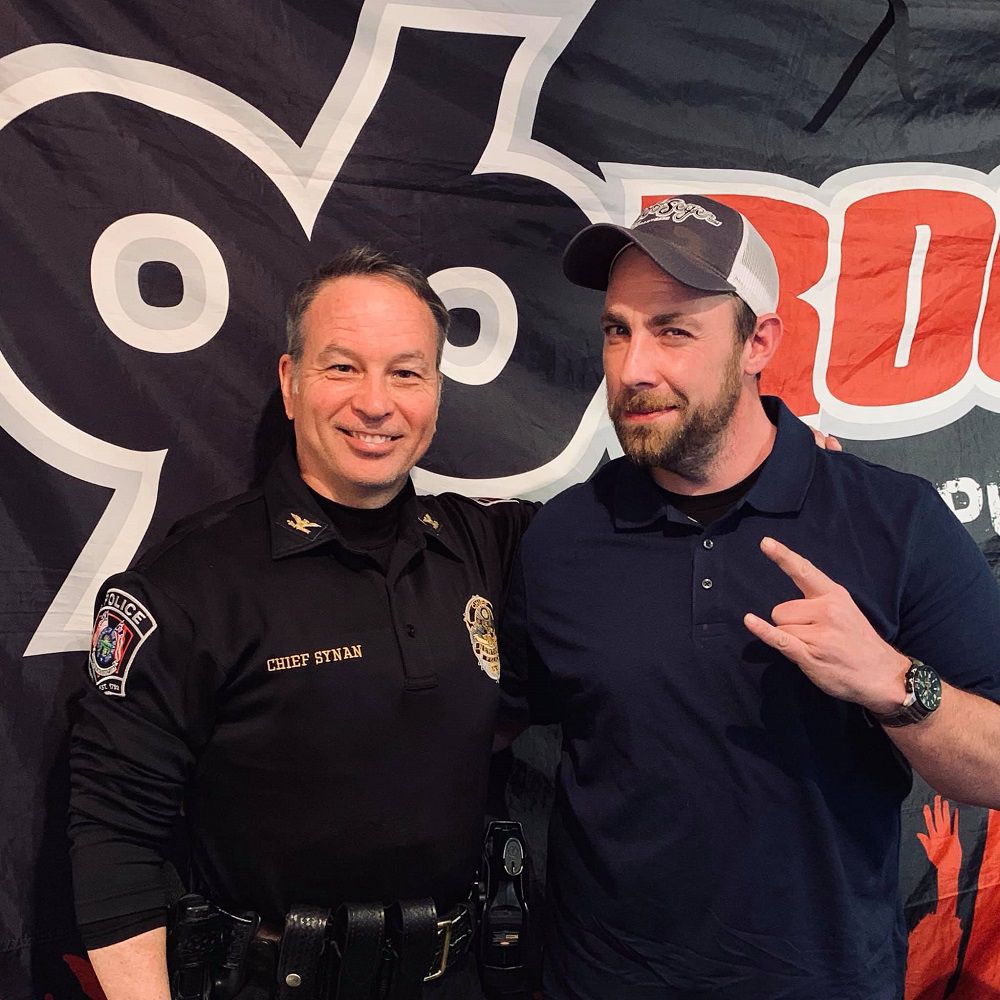
Batman and Robin
Aaron Laine is the self-acclaimed “Robin" to Synan’s “Batman,” both on a journey to help those in recovery reach the other side of addiction.
Synan got to know Laine via social media and while speaking to some of the same recovery groups.
When Laine asked the police chief to be a guest on his podcast, “Tragedy to Triumph,” Synan thought that was “super cool,” he said.
Laine was in recovery from addiction and on his podcast talked to others in recovery, with the occasional guest like Synan to offer sage wisdom from the other side of addiction -- the law enforcement side.
But it was Synan who learned a lot from their open dialogue over the internet airwaves, he said.
“What's so cool about Aaron talking is he's so open and vulnerable. And he makes you do the same thing,” Synan said. "Here's a guy who has a platform from a person that recovered, that ran from the cops, hid from cops, stole from his kids, did everything you could talk about being bad, and now he's giving back — he wants to change that image, and not just his image, but he wants to see how can he collaborate more with other people.”
Then enters the “cop,” seemingly the addict’s arch nemesis, Synan joked.
“Yet, we're not. We’re having this in-depth conversation and honest conversation about both of our lives — being open, being vulnerable for sharing as human beings,” he said.
Telling your story, Synan said, is a vulnerable thing but it is what inspires others and that spreads like wildfire.
"That's the spark that leads to the inspiration that gives people the ability to be empowered to speak their truth,” he said.
By having his podcast, Synan said, Laine is saying, "Don't just listen to my story, but listen to someone else's story. See how they connect and how they interact, and how they collaborate. And when you do that, that's where you find solutions."
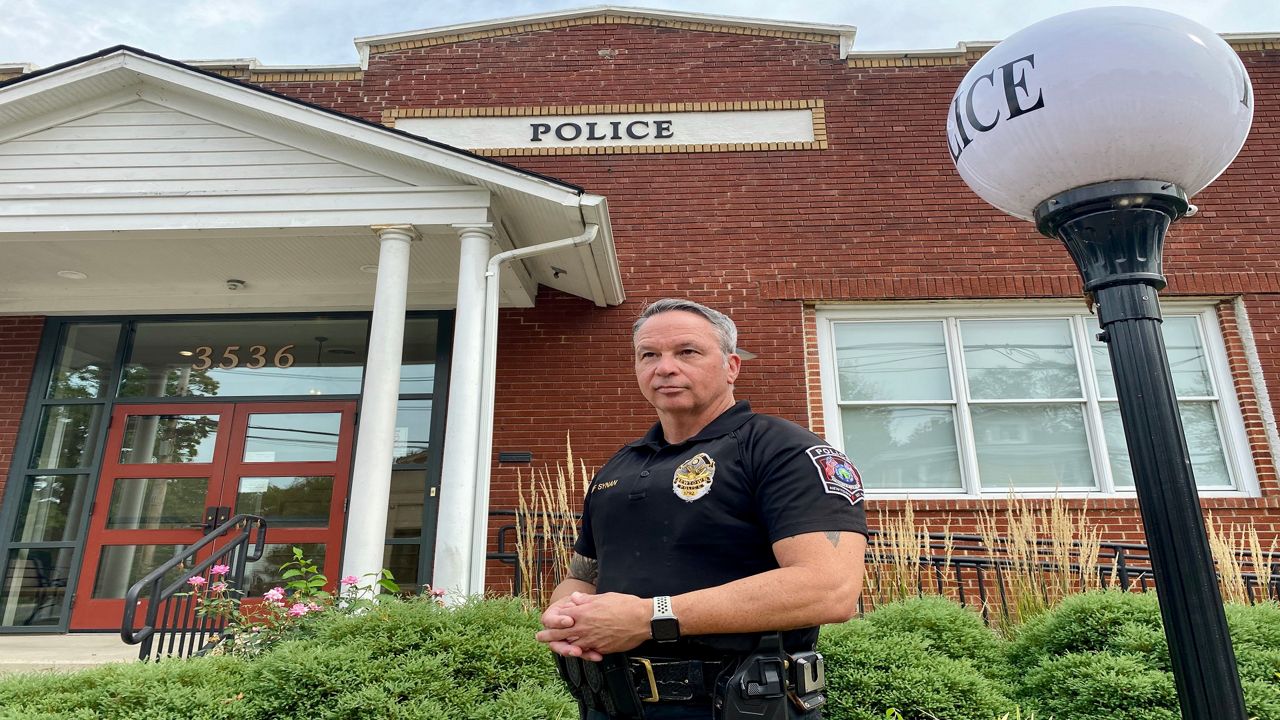
For Synan, watching those like Laine and Bryant shows him what is possible and there is something to be learned from both of them. And with their friendship and through the work with the coalition as his inspiration and most useful tool these days, Synan hopes to help others carve out their own path to the other side of addiction.
"Society looks at vulnerability in humility as a weakness. It is the strongest characteristic a human being can have. Because you're putting yourself out there and exposing yourself to judgment and criticism. If you can learn to show people by grit, determination, perseverance, humility, and by vulnerability, like they do every single day, you'd be successful,” Synan said.
They inspire him and remind him how to look at each day with purpose, he said.
"Don't forget the past. But don't let the past hold you back. Focus on today, and what you can accomplish today. But never lose sight of your vision and your goal. And honestly, that's what they taught me to see the perspective from the past to the future and everything in between. and the characteristics it takes. grit, perseverance, determination, humility and vulnerability.”
So, maybe he hasn’t changed the world, yet.
Perhaps, he has.
But Synan does believe that all three of them are making strides in that direction in their own unique ways.
Laine using his podcast to reveal different perspectives and philosophies, Bryant using her experience to help others in recovery and his work with the coalition and as law enforcement, are all, in their own way, and together having those conversations and seeing each other as humans, changing the world, Synan said.
Their stories, he said, humanizes addiction. It puts a face and a name to the struggle and opens the door to honesty.
“That's how you change the world, is by each person being open enough and being willing to connect, tell the human story. And when you tell the human story, man, everyone can relate to it. Because in the end, that's what we all are as human beings,” Synan said.
Synan, Bryant, Laine all took different roads on their journey to the other side of addiction.
For Synan, the young, skinny, short, weakest link in the Marine Corps, who vowed that he was going to change the world, took a path that led him to his mission, his purpose to uncover new ways to look at addiction, recovery and solutions — saving lives.
"When you have purpose, you have compassion for others, you have understanding for others, and you do whatever you can to help the weakest link thrive. Because you know, in turn, it helps you thrive,” Synan said.
